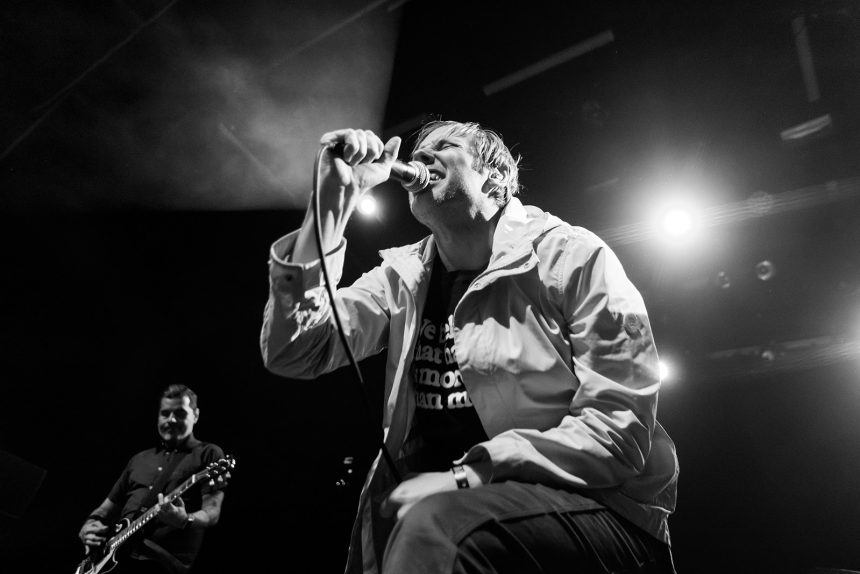Saturday afternoon in the underground lounge at NY’s Irving Plaza, I’m in the presence of three men who I can confidently call my heroes, just trying to keep it cool and be less clammy. It turns out I’m not the only one attempting to temper giddy admiration. To my right, behind a curtain of hair, is Keith Buckley — a metalcore pioneer, published author, and lead singer and lyricist of Buffalo’s beloved, now-disbanded Every Time I Die, who is currently making headway with his new band, Many Eyes. To my left sits Walter Schreifels, whose creative accolades and impact on the New York music scene would be a feat to list — ranging from groundbreaking hardcore outfit Gorilla Biscuits to post-hardcore powerhouse Quicksand to the indie-rock-adjacent Rival Schools. Finally, facing me head on, is Geoff Rickly, the vocalist and lyricist of Thursday, who pushed alternative/post-hardcore music to its very limit with a nonconformist attitude and sound that drew from new wave and punk, laying the foundation for the early aughts’ second-wave emo.
Read more: 15 greatest supergroups across rock, punk, and metal
In the venue basement, hours before they’ll each hit the stage, Buckley, Rickly, and Schreifels reflect on the rock kismet that’s brought each of them here. Tonight is the final stop on an iconic tour, the celebration of Thursday’s War All The Time 20th anniversary — an album once received as blisteringly chaotic and divisive that today is cherished by Thursday’s fanbase and beyond. Rival Schools have come together in support, their first tour in a decade, and Buckley’s Many Eyes makes their official debut. Needless to say, wandering through teenagehood and timelines, talking of past tours and long-gone record stores, the idea of looking back is as prevalent as being present, or even as pushing forward.
So this is the last stop on your tour. How does it feel? How has it been?
WALTER SCHREIFELS: It’s been amazing. A little bittersweet for it to end, but very excited for it to be in New York. It’s a beautiful day, but the tour’s been so fun, so a little sad to see it end, but it’s been awesome.
KEITH BUCKLEY: I had a staph infection, so I’m pretty happy that’s cleared up.
The whole time?
BUCKLEY: No. [Laughs.] Just the first week-and-a-half started to tour off on a rough leg, but it’s about survival, and here I am. This was also the first time playing in this band. And the first time really sober, ever, on a tour. The last time I was on tour was three years ago, and I was just getting sober, so I think I still had some of the fumes in me, like all the adrenaline. But this has been remarkable. To see the world and to see friends like this with this clear perspective is just incredible. It feels really good. So, it’s very bittersweet that this is over.
GEOFF RICKLY: Yeah, I did a tour three months into sobriety. Well, even sooner maybe. And it was the same thing. The band was probably like, “He’s still high as shit.” [Laughs.]
BUCKLEY: Shit. Yeah, exactly. I think people thought I was still drunk. I was just running around, like “I’m free. I’m free!”
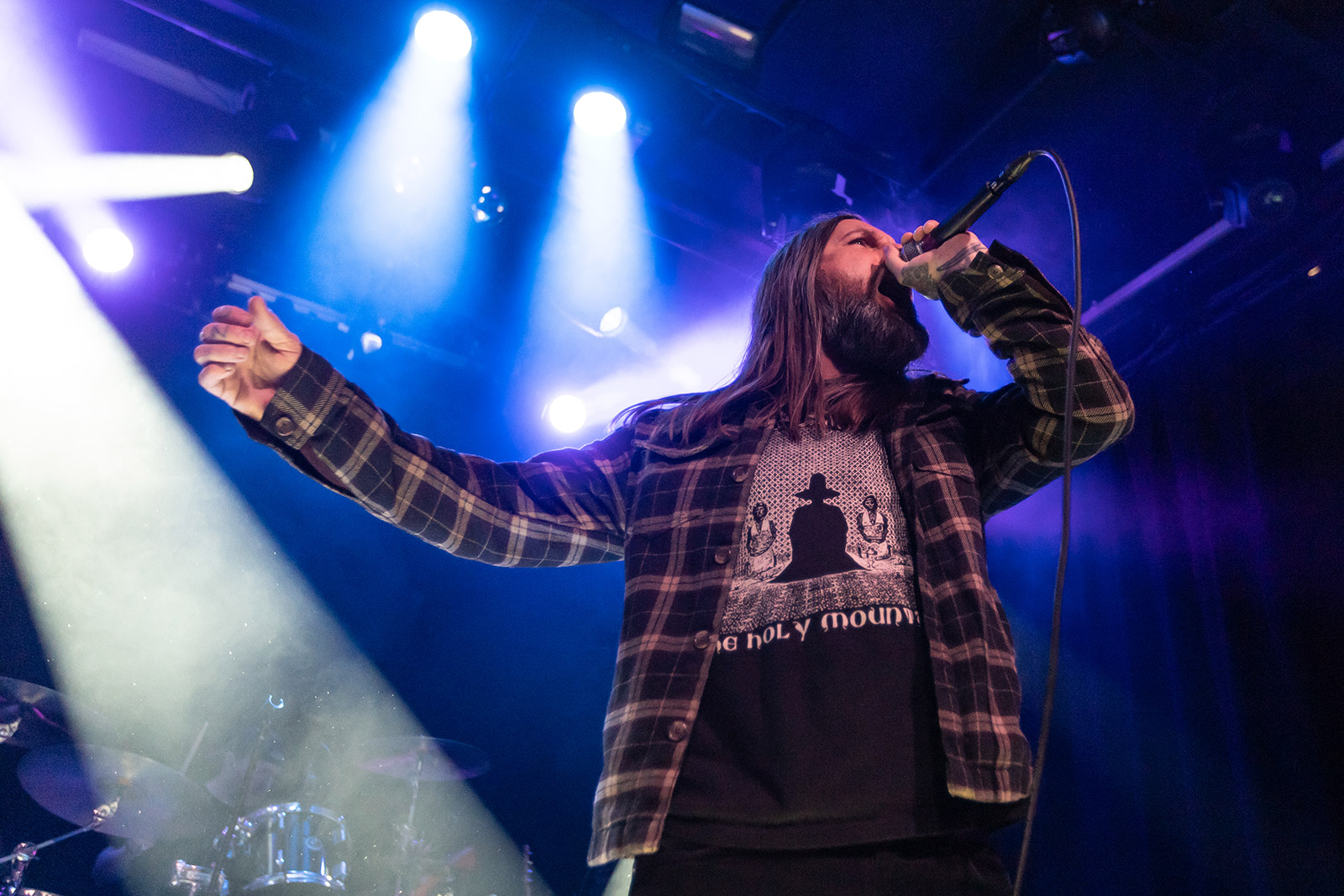
Body keeps the score, huh. I see it as kind of like that — I’m also sober, and there were a lot of things that I did the first time, after doing them fucked up for so long, that actually felt just as off in early days.
BUCKLEY: It’s still there. If people really want to feel what it’s like to have the effects of total dissociation — and I mean abject depression — give up drinking for about a month. It’ll really send you there. But after that, it’s amazing.
So maybe this staph infection was a welcome distraction?
BUCKLEY: There you go. I’ll believe it.
RICKLY: Walter, by the way — I love the three sober people over here, just going off, and you’ve been like, “Damn.”
SCHREIFELS: Well, to be honest, early on, I was a straight-edge movement person, so there’s always been a little “straight-edger” inside of me that can relate to sobriety. I don’t feel the odd one out… And I get it: I have two friends here that have gone through hell with the kind of addictions that play themselves out, and I’ve gone through that with a lot of different friends as well.
BUCKLEY: It’s really good to have balance with people who can show you that real human beings can moderate, you know what I mean? Especially with Walter, I didn’t even really know that he drank because he’s not falling over every night. He’s wonderful onstage. You realize that everyone has their own speed and that you’re just going at your own speed. You just watch everything manifest around you in the way that it does, and you don’t really judge it or have an attraction to it. You just are like, “All right, that’s cool. That’s now a part of my life. Take it for what it is.”
Being here, this is a hometown show for you all, more or less. How’s that?
RICKLY: Yeah, technically all New Yorkers. But the cool thing is we started in Buffalo, Keith’s hometown, and we’re ending here, so it’s pretty cool that we get to share that.
BUCKLEY: It’s a full-circle story. There’s been a lot of firsts. Like I said, I haven’t really played a show in two or three years, so to come back to Buffalo and to do it, presenting a new band, a new self, new ideas and to start the tour off — it was really baptism by fire, but it had to happen. You just keep going straight ahead.

Heavy. What was that experience?
BUCKLEY: It was nerve-wracking. There’s a lot that’s gone on in Buffalo since the breakup of my last band — I have a lot of enemies that I didn’t have, and a lot of them were there to see me, and I knew it. I had family members who I don’t talk to anymore there to see me, and I knew it. It was high tension. But I got through it, and like I said, it’s just about surviving, and then proving to myself that, “No, this band is worth it.” This is a great experience. I’m still trucking.
SCHREIFELS: You think that they were there to just see you do well, or?
BUCKLEY: They were there to see me not do well. Those are the kind of people I had to leave behind. The kind people that got me sober, because those “friends” were only hovering around me to wait until I failed, and then they go on to something else… But to know and recognize that about them 1709080735, and see it come true. All the books say toxic people do this, and they’re just that. Textbook toxic. So you just expect it, and be thankful that you’re sober, not with them anymore, and it’s all far away.
SCHREIFELS: It’s cool that you faced it, knowing that, and did fucking amazing… You might be giving them some peace, too. They saw that you’re doing your thing, and it’s fucking solid and maybe they could find something else that I hope so they could fixate on, and maybe that you might have given them a little bit of peace.
BUCKLEY: The best thing that could possibly happen is for everyone to say that me doing what I did was the best thing that ever happened to them. You know what I mean? If all of these people could finally realize that I actually did a lot of people a favor by removing myself from the picture. But it’s still the beginning. You need more time and experience.
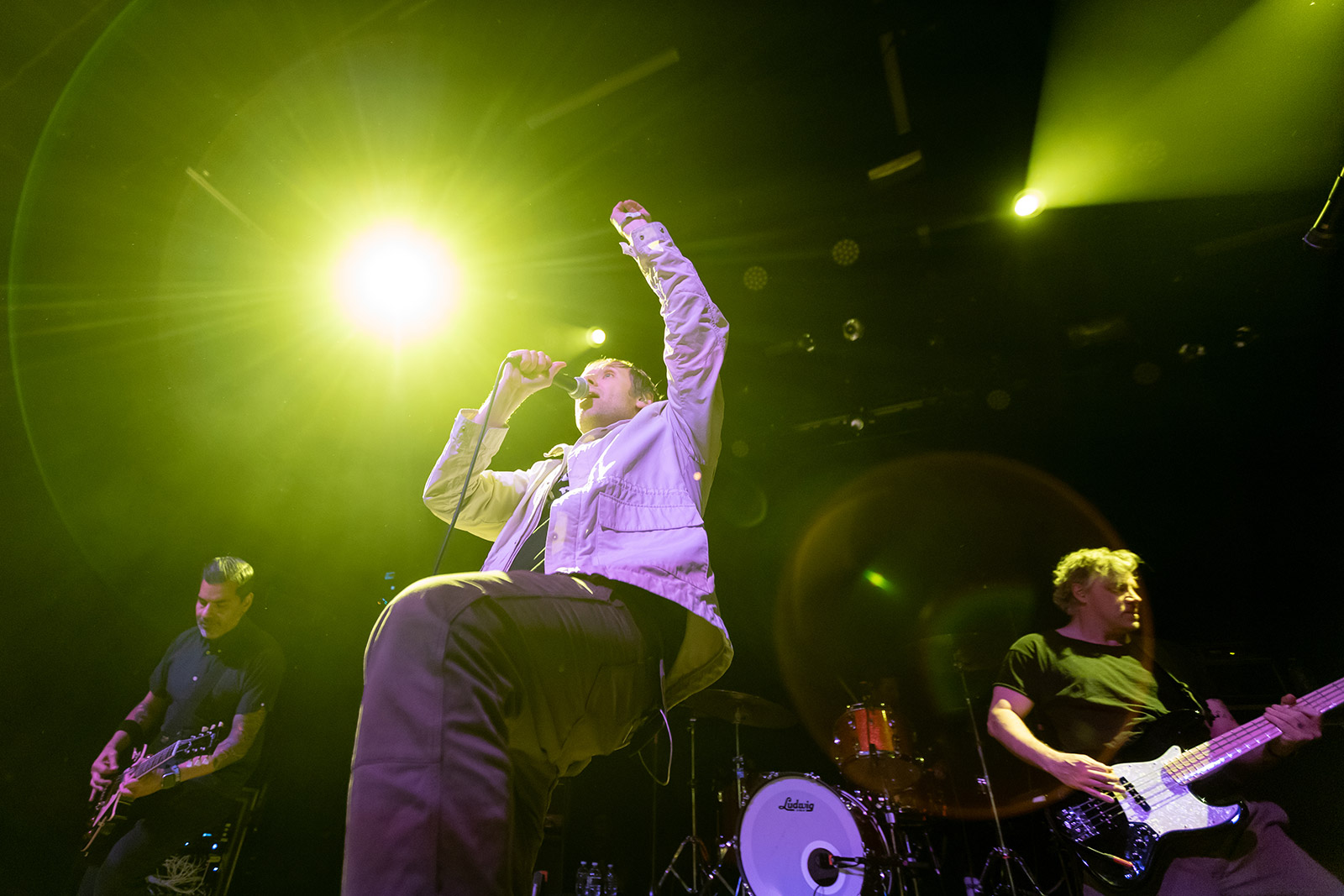
In which combinations have you three toured together previously?
SCHREIFELS: Keith and I haven’t toured together before. But Thursday and Rival Schools went on tour early, when Full Collapse had just come out or something like that. It wasn’t a long tour, but we just became such quick friends and had so much fun. And we were labelmates for a while.
RICKLY: We went to some really weird Island Records parties together.
SCHREIFELS: We definitely went to some weird parties together. And we went through all of these music experiences, finding ourselves still close after all these years, still excited about music and pushing things forward, and still like-minded. It’s really awesome to have that. This tour is like that. And Keith, even though we haven’t toured, is a fellow traveler in this world that we have played a part in making.
BUCKLEY: It’s another one of those things where you kind of feel like maybe these relationships have been put on hold until all the members are ready to accept the relationship, and to handle it. Now we’re finally all together because we’re at the part in our lives where we can figure out how to do it best instead of fuck it up. These are some pretty solid friendships. To think that there’s the potential in us to ruin it is really sad. I think younger versions of us would’ve ruined these relationships, but now I think we’re ready for ’em.
What do you mean by that? Are you speaking to addiction, ego, competition?
BUCKLEY: All of it. And specifically, I could see myself, if I were drinking right now, having a night where I just overshare — how much I love these guys, and then it makes things fucking weird. Then they realize that they’re my idols, and not just my friends, and it screws things up, and then everyone’s tiptoeing around each other. So that didn’t happen on this tour. [Laughs.]
I’m trying to navigate this question — but when was the first time you interacted with each other’s work, or each other? You heard the music, you met, you saw the first person play for the first time…
RICKLY: I remember buying the Quicksand seven-inch really early on in Philadelphia, at a record store across the street from this club called J.C. Dobbs, which hasn’t been around for a long time. I thought it was really cool, and then when Slip came out, I got obsessed, and I would go see them every time that I could. I was telling Walter the other night, I had a friend’s band who practiced in the same rehearsal space as them, so we would go on nights that they weren’t practicing and listen through the wall when Quicksand was rehearsing.
BUCKLEY: That’s awesome.
RICKLY: It’s pretty creepy, really. But it’s pretty wild to think that somebody who is my hero I get to be on the tour with. Also, I don’t think I’m a stalker anymore. So it’s cool. We can actually have a real relationship that’s not based on me being a kid that’s had his mind expanded by a band. And with Keith, it was, we played a show when [Every Time I Die] put out the first record in Buffalo. I remember we were like, “Holy shit, that Buffalo band is insane.” Then you gave me a copy of the record. And that was before Hot Damn!, when I think ETID became the band that everybody thinks of as ETID. But that first record, I was like, “These lyrics are really interesting.” You’re a smart, cool person. Suddenly I want to know more. Maybe you’re not all the way there to where you’re going yet, but I want to know about it. And then when Hot Damn! came out, I was like, “Holy shit.”
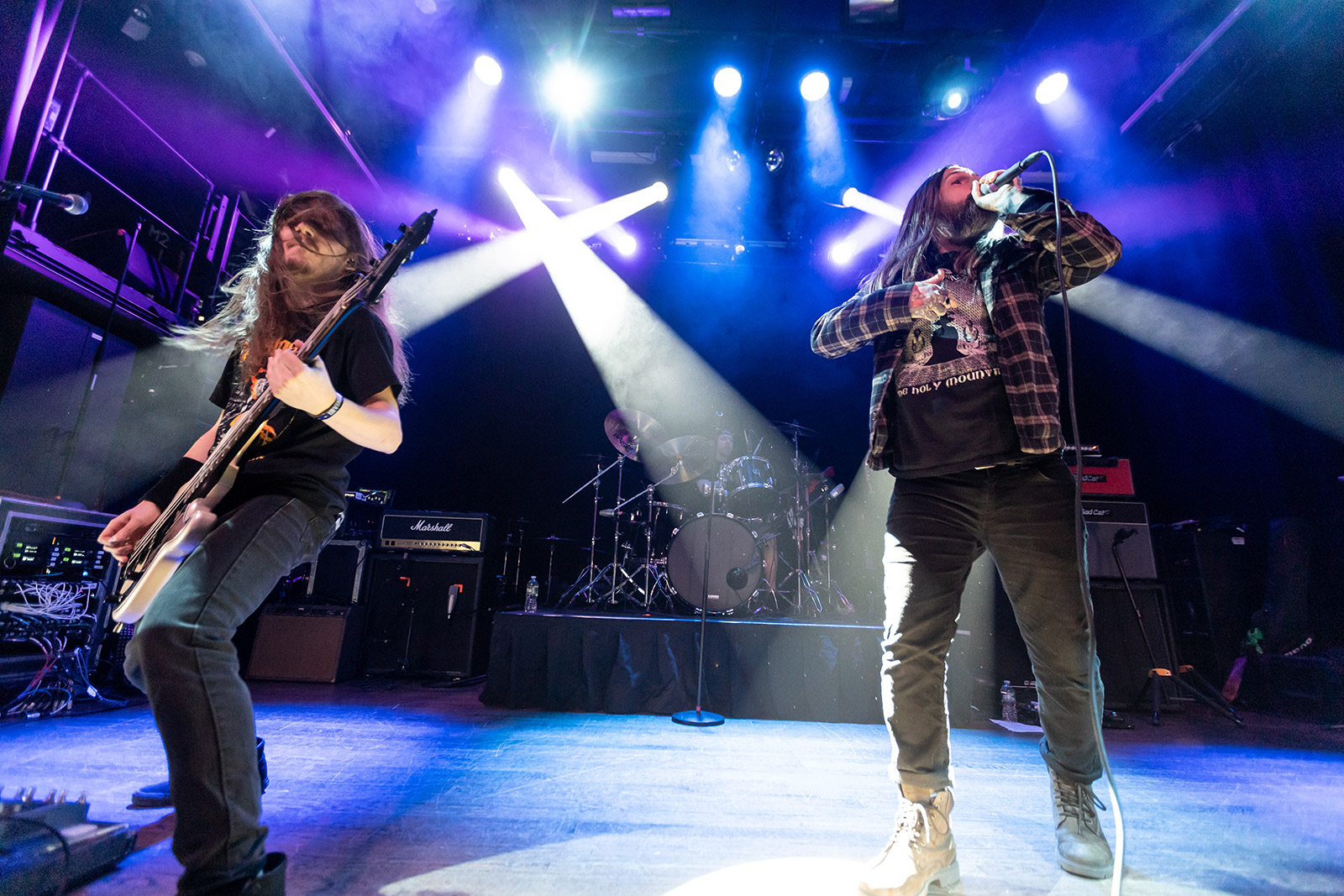
BUCKLEY: See, that’s how I always felt about Geoff. When I met him, I approached him like an editor. “Hey, here’s my stuff. Tell me what you think of it. Make some notes and let me know, and then I’ll go back in, on the next record. I’ll do better.” I just looked up to him so much. He was a real writer. He had lived “the life,” and like he said, recognized one day I’d get there. I just didn’t have the experience. But it felt like Geoff just had so much experience in such a little body, and I was like, “Oh my God. Someone who’s my own age and who hasn’t been in the world very long has done all these incredible things that he’s learned and taken things from.” I was just so enamored by that. And Walter — when I was 13, I had an uncle that would hire me to cut his grass. Every week I’d cut his grass and he’d give me money, and I’d take the money and go buy a tape that I would listen to on a loop until the next time I cut his grass. It was a cycle, and Quicksand was part of it. Listening to that tape, I thought, this guy just knows. There’s just some connection. It makes me feel something, he’s totally different kind of lyricist and totally different kind of vocalist. And I stuck with Quicksand. Then when Rival Schools and Good Things came out, I was like, “Again, who is this beautiful man that is putting these sentiments into this aggressive music scene? I need to know who he is.” So now, knowing who he is, it’s awesome.
SCHREIFELS: Oh man, thank you. The first time I saw Keith was that first show in Buffalo, which is really amazing. It’s interesting hearing the way you described it, because it just seemed so fully formed, and your voice is just so awesome. Even your speaking voice, you can hear this humility, and these choices you’ve made, and just the feeling that you put into it all — it’s no wonder you’ve been so successful. With Many Eyes, it’s all still there. The band freaking rocks, and stepped up to the plate day one like you guys have been doing it for years.
BUCKLEY: It’s all because we’re growing in front of people who nurture things, you know what I mean? We’re a plant in the house of someone with a green thumb. We’re lucky we’re not being deprived of any advice or kind words. It’s a bunch of wonderful people who are surrounding us and encouraging us.
SCHREIFELS: It’s a great vibe. And with Geoff going back to the Rival Schools days, when we were putting out our record, I felt a little bit out on our own at that time. It was no longer a Quicksand kind of thing, or for anybody familiar with Quicksand. It was something else. I didn’t feel like there was a peer group at that time, until I met the Thursday guys. They were younger than us, and they had picked up on a lot of things that maybe we were doing with Quicksand, but contextualized it with their own tastes that were way more varied. There was a lot that we shared, and a lot of things that I didn’t know as well. I felt a kinship immediately.
Especially with Geoff in particular, he just has an iconic presence onstage — how he moves his body, how he engages the audience and his voice, obviously, and how the band is so supportive, super tight-knit. They had that then and still have it now. Even now with different guys. With Thursday, I had this feeling of, they’re younger, but there’s family here for us, and there is a greater context. And I still feel that.
RICKLY: It’s probably even harder for younger kids to imagine how out on a limb Rival Schools seemed at the time. I read something recently where Justice [Tripp] from Angel Du$t said, “I don’t know if people get what I’m doing until a few years after I do it.” It’s getting hardcore kids into Britpop, and I feel like Rival Schools was trying that 20 years ago. And people at the time were like, “What is this? Is it hard? Is it not hard? Is it?” It went over well, but it’s still about, “I’m going to jump out on this limb and see if people follow me or not.” I love that.
SCHREIFELS: We weren’t part of a trend, with Quicksand, but there was some sort of grunge, noise thing that we went with. But with Rival Schools, we had to find our own family. And Thursday were definitely a part of it.
Looking back, on all of that coming together, it’s especially interesting that you are together, celebrating an anniversary — two 20-year anniversaries. And conversely, celebrating a brand-new band.
SCHREIFELS: It’s all these cycles completing at the same time.
When you’re doing an anniversary album play, looking back on two decades of an album, how do you feel or stay present in that experience?
RICKLY: Today, I love War All The Time more than I did back then. After Full Collapse, we went to a major label, and everybody expected us to make this big record. So we made this chaotic, dark, weird, sad, paranoid record, much to our labels’ chagrin. And even at the time, when we started playing WATT, it felt like too much. Too heavy. I’m singing nonstop the whole record, trying out notes that I’d hit once in the studio, you know what I mean? Like, “I can’t do any of this live, and you want me to do it 90 nights in a row?” It was just really hard. I am an incredibly sensitive person that didn’t know what to do, being thrust into even a small spotlight. But now that I have some distance from the record, and I see the way history has unfolded from that time on, I feel like War All The Time makes more sense as a record now than ever. It’s truly been all war since then.
BUCKLEY: Give it another 10 years. It’ll be even more relevant than it was at the time it was created.
RICKLY: Now even it doesn’t seem like that dark of a record to me. It’s more real.
BUCKLEY: Hopeful, almost.
SCHREIFELS: Prophetic.
RICKLY: It’s funny, from a purely musical standpoint, I’ve started to realize that the middle third of the record is all ballads. Back then, we were trying to play them as if they were also punk songs, twice as fast as we do now. Today, we lean into the softer section of the record, and it works. There are ebbs and flows, and it’s been nice to rediscover the record. I get to have positive relationship with this thing, because maybe a year into touring the record, I remember standing in the mirror and thinking, “I either need to break up the band or kill myself. I’m so desperately unhappy.” That was about 2004-ish.
SCHREIFELS: My experience is different, but in the way that it’s the same, you went from doing your own thing where you’re like, “OK, here’s my friends. We’re making a band.” We’ve got all this thing, this momentum in that natural kind of beautiful way to OK, now we’re going to join this major label, and there’s all these people that are trying to get in the pot, building expectations, pushing 90-day tours. It adds a grind to it, which some people are suited for. But you have to reckon with it. And it could go any different way, you know what I mean? I don’t know as much about Every Time I Die, but if your band really fucking hits that must be insane, too. How do you keep your shit together when so much is coming at you, people just whizzing by. But it definitely feels like now that we’re doing it on our own terms. It doesn’t fucking matter. Everyone’s already down for it. We can have and appreciate the chill moments without worrying about playing a hit. That’s when it’s fun.
RICKLY: Tucker’s got a great thing that he says when the balloon gets overinflated. Somebody’s talking about how many people are at the show or whatever, “Oh yeah, we’re going to get signed tonight.”
BUCKLEY: The fact that you guys went from Full Collapse to WATT, and onto a major label… The whole scene was watching you guys. I was one of those spectators watching, knowing this could be amazing, and hoping it would be. However, I had seen bands like Haven signed a major label, and all of a sudden we didn’t really hear from them anymore. They had been one of my favorite bands. I was like, “Please do not let this ruin Thursday.” Bands like all of us and everyone in the scene was really making history. There was never any precedence given in the history of music before where kids were getting record deals based on aggressive music. You guys were really taking a lot of the shots that bands like us could look at and use as an example, see that we could do it too.
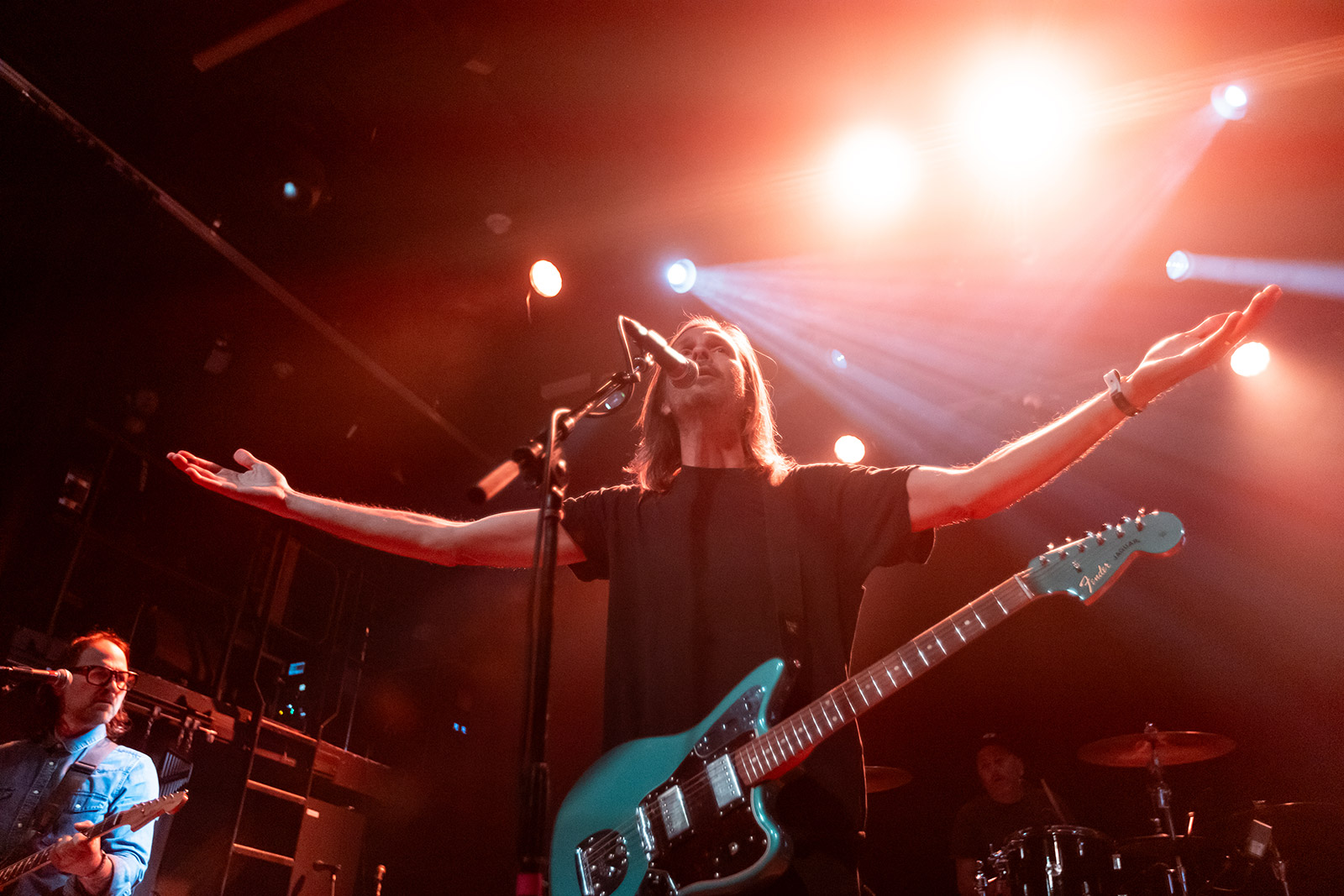
RICKLY: I think of that saying — the first person that tries to get through the door bounces off the door, and doesn’t get through. The second person gets through the door, but only through the door, then falls flat. And the third person just walks through, chilling. By the fifth person, don’t even bother to go through anymore. I think about all the ’90s bands that really were doing that, going on a major label, and getting fucking beat up. The Jawboxes of the world. But Walter, you all had a great career, and it didn’t ever feel like an overly major-label record. It also didn’t feel like you were getting shelved and nobody was allowed to hear it or something.
SCHREIFELS: We had a pretty decent experience, to be honest. But it’s not so much about major labels, but about your project, your thing, especially the ones that we’re talking about. We love music. We got friends, we’re going to make a band, we’re having fun, we got a show. Holy shit — people like us. Then you get to this point where it’s like, “Oh God, we’re going to be on TV.” If you even see yourself as an artist or as whatever the hell is happening to you, how do you navigate that? And there’s a lot of things that are just outside of your control. Like anything in life, like your record — you could be a great band, but the label gets bought out by some other corporation at the time, and then your record doesn’t come out until six months later. It fucks up the whole time-space continuum. You just have no idea how that’s going to play out.
The thing that we benefited from, or what I have benefited from, was the experience of doing it without all that shit. I played shows for my peers, organized by my peers, where the T-shirts were screen printed by me. Badly, but I understood all those different things. I was way more grounded and less swept up in it all. And now we’re here, we’re still doing it. All our hearts were true, it’s our path artistically, and just life-wise. That’s pretty fucking awesome to look back on.
BUCKLEY: It’s amazing what will come into play when truth needs to continue to be spread. And I think that’s probably the best way to describe music like ours and yours. It’s lasted this long because it’s true. People look for truth and they hear truth, and when they get truth, they don’t let truth go. So now we’re still luckily here, because the truth doesn’t really change very much.






